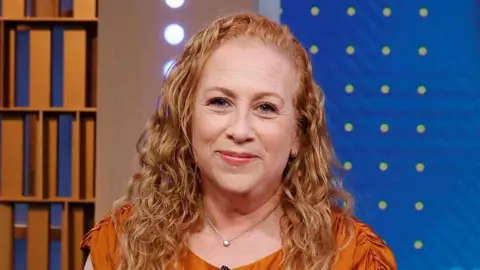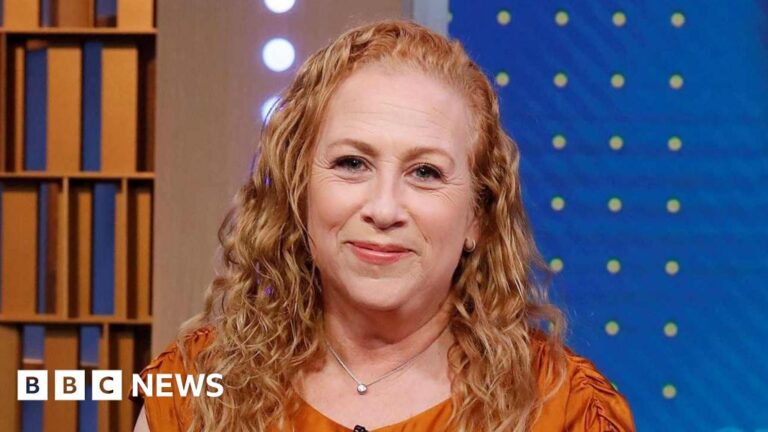Emma Saunders,Cultural journalist at the Hay Festival
 Getty Images
Getty ImagesBestselling American author Jodi Picoult has said that “the loss of free speech is a very, very slippery slope” and that the fact that two of her books are banned in school districts in some US states is not “not a badge of honor.”
Speaking at the Hay Festival, Picoult said she was “very lucky because I’m at a point in my career where the people who are going to buy my books are not in school libraries”.
But the author, who has written 30 books and sold about 40 million copies, said that’s not the case for young authors, LGBTQ writers or people of color, “whose livelihood consists of writing for middle grade and young adult readers. They are suffering enormously.”
Picoult said her books My Sister’s Keeper and Nineteen Minutes were affected by the bans.
Nineteen minutes
Some libraries and classrooms in the United States have deleted books with sexual content or themes of sexuality, gender identity, and race.
While some see this as censorship, others disagree. Some state authorities, such as Florida, have said they will not ban the books. but restricting inappropriate and harmful material.
“I’m currently banned in about 35 U.S. states in school districts,” Picoult told the Hay audience.
She said the reason Nineteen Minutes, which concerns a US school shooting, was banned was not because of the filming scenes: “They have no problem with it. The problem is that on page 313, I use the term “erection”.
When asked if it ever made her think about changing what she wrote, she said, “It just makes me want to keep doing it (what I’m doing). »
 Getty Images
Getty ImagesPicoult also discussed his upcoming novel, By Any Other Name.
This isn’t her first foray into historical fiction, but this time it’s a side story about young contemporary playwright Melina Green, who is struggling to get her work recognized in New York, and her ancestor, Emilia Bassano, who might – or might not – have been the writer behind Shakespeare’s work.
“I feel like this is the book I was meant to write my whole life,” Picoult said.
“It’s really a book about how things have changed for women in 400 years – and how they haven’t.”
Although Picoult’s book is, of course, a work of fiction, Bassano was a real Elizabethan woman.
Picoult does an excellent job of convincing Hay’s audience to at least consider the idea that Bassano wrote some of Shakespeare’s works, citing various theories she came across during her research.
What is indisputable is that Bassano (later known as Emilia Lanier) was one of the first female poets published in England in the early 1600s.
There is also a theory that she is the Dark Lady who features in many of the bard’s sonnets (although Picoult is not convinced).
“The truth is that I did a lot of research for this book. And I’m not going to tell you what to believe, I’m just going to give you the facts,” Picoult said, later adding that she thought several people probably wrote Shakespeare’s plays.
A frustrated academic
Picoult is known for her meticulous research. If she were an actress, she would certainly be a proponent of the technical method.
“For me, the research is actually the most fun part of the book, because I get to live other people’s lives,” she says.
“So I did everything you see in a book or everything a character does in a book.”
This research includes visiting death row for Change of Heart and living in an Amish family for Plain Truth. Perhaps surprisingly, she says the latter was “the hardest… they worked so hard, I never want to do that again!”
Unlike many authors, Picoult’s books are all very different, spanning various genres including thriller, romance, ghost stories, and historical fiction.
“I’m really, really lucky. I can write about whatever I want, and somehow I have readers who say, “Great! A lot of writers don’t have that luxury,” she says.
“I also think a lot of writers make the mistake of chasing what they think is popular at the moment. I have always subscribed to the mantra that if I write what I want to learn, it will be… the best book I can write at that time. And I’m going to make you as interested in the subject as I am.
“I’m really that frustrated academic who doesn’t go to school anymore and just wants to learn a lot! I don’t want to write the same book twice. And if I do… that’s probably when I should stop writing.



